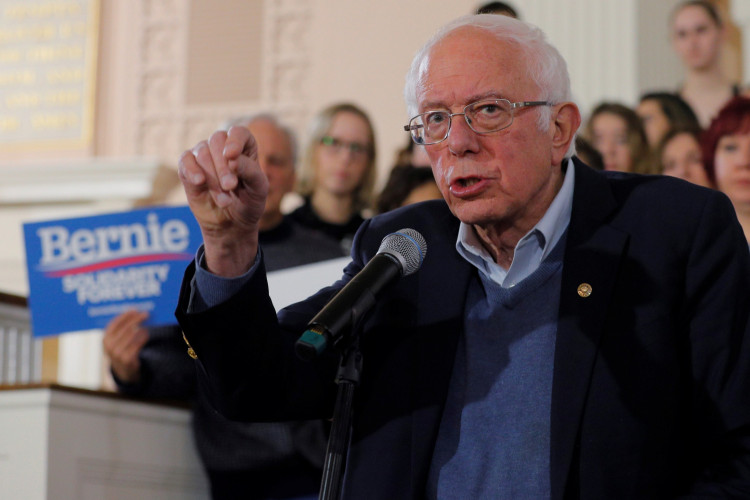Sen. Bernie Sanders, an independent candidate from Vermont aiming to become the Democratic Party's 2020 presidential nominee, is the widely accepted champion of the "Medicare for all" concept that will drastically overhaul -- ostensibly for the better -- the existing Medicare program for elderly Americans.
Sanders promises to implement Medicare for all if elected U.S. president in 2020. He's released more details of his plan, which he first introduced as legislation in 2017.
In 2017, Sanders authored the "Medicare-for-all Act of 2017" (S. 1804), which was a parallel bill to the "United States National Health Care Act" (H.R. 676) introduced by Rep. John Conyers (D-MI) in the House of Representatives.
The act plans to establish a universal single-payer health care system in the United States for healthcare services provided elderly Americans. In a single-payer system, most medical care will be paid for by the federal government. It will do away with the need for private health insurance and premiums.
Medicare is the popular national health insurance program for Americans 65 and older and for disabled younger people. It also provides coverage for people with end-stage renal disease and amyotrophic lateral sclerosis (ALS or Lou Gehrig's disease).
Medicare currently covers half the healthcare expenses of enrollees. In 2018, Medicare provided health insurance for some 60 million individuals consisting of 52 million people age 65 and older and about 8 million younger people.
Medicare for All builds on Medicare. It will be transferred to a new system under Sanders' Medicare for All plan. Also to be replaced by this new system will be all other health insurance plans.
Sanders' Medicare for All plan will establish a single national health insurance plan for every American, and will be managed and paid for by the federal government. Medicare for All will abolish many of the health insurance costs elderly Americans now pay. Among these costs are monthly premiums and copayments paid when a person goes to the doctor's office or hospital. Also to be eliminated will be deductibles or the amount a person pays before insurance coverage is applied.
Under Sanders' Medicare for All plan, all Americans will receive coverage for comprehensive healthcare services. These services consist of doctor visits; hospital stays; emergency room visits; substance use disorder treatment; dental, vision, and mental health services; long-term care and reproductive health care. Prescription drug cost sharing will be capped at $200 annually pepending upon income.
Medicare for All will be more generous than the existing Medicare program.
"It (Medicare for all) would improve the generosity of health coverage," contends Charles Blahous, senior research strategist at the Mercatus Center at George Mason University and a former economic adviser for president George W. Bush.
Medicare currently requires people to pay a monthly premium for doctor visits, a premium for a separate drug coverage plan, a deductible for hospital stays and costs for skilled nursing (such as physical therapy) after 100 days, among others.
On the other hand, Medicare doesn't pay for long-term care. In 2016, these out-of-pocket costs averaged $5,460 for Medicare beneficiaries annually, according to the Kaiser Family Foundation.
To be absorbed into Medicare for all will be Medicaid (which provides free health insurance to 74 million low-income and disabled people); the Children's Health Insurance Program (CHIP) that covers uninsured children in families with incomes that are modest but too high to qualify for Medicaid; employer-sponsored health insurance and individual health insurance plans.
Medicaid is a federal and state program that helps with medical costs for some people with limited income and resources. It's the largest source of funding for medical and health-related services for low income people in the U.S.
Under Sanders' Medicare for All plan, enrollees will receive a "Universal Medicare" card. There will be no separate health plans such as Medicare Advantage plans managed by private insurers.
Sanders' Medicare for All won't affect the Veterans' Administration or the Indian Health Service. It will, however, abolish TRICARE, the health care program for the military. The health care program of the United States Department of Defense Military Health System, TRICARE provides civilian health benefits for U.S Armed Forces military personnel, military retirees and their dependents, including some members of the Reserve Component.
"The country would end up with one health system," noted Donald Berwick, president emeritus of the Boston-based nonprofit Institute for Healthcare Improvement and a supporter of Medicare for All.
Sen. Sanders' Medicare for all will cost anywhere from $20.5 trillion to $39 trillion over 10 years in additional federal spending. As for funding his plan, Sanders proposes several potential options: a 4% tax on employees (exempting the first $29,000 for a family of four) and a 7.5% tax on employers (exempting the first $2 million in payroll). He also proposes a tax on "extreme" wealth, boosting estate taxes and increasing the marginal tax rate for those making more than $10 million.






